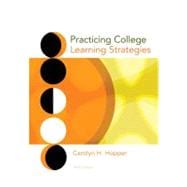
What is included with this book?
| Survival Kit | |
| Musts for the First Day of Class | |
| Ten General Survival Tips to Keep You Afloat | |
| Evaluating Your Classroom Savvy | |
| Survival Tips for Taking Notes and Reading Assignments | |
| Survival Tips for Taking Tests | |
| Before You Begin | |
| Taking a Test | |
| Checklist for Essay Tests | |
| A Dozen Reasons to Review a Returned Test | |
| Obtaining Your Technology Survival Tools Email Etiquette Survival Tips for On-line Courses Modeling the Learning Process: Your Map in Learning How to Learn | |
| The BREATHE System | |
| The Big 3: Posture, Neck and Shoulder Muscles, and Breath Support | |
| Assignment Log | |
| Applying the Principles of Time Management | |
| Beginning Steps in Time Management | |
| Scheduling: The Road Map or GPS for Time Management | |
| Benefits of Scheduling | |
| Principles of Scheduling | |
| Time Log | |
| Time Log Analysis | |
| Planning a Master Schedule | |
| Master Schedule Worksheet | |
| Putting Your Master Schedule into Practice | |
| Master Schedule Follow-up | |
| Master Schedule | |
| Date Book | |
| To-Do List | |
| Side Trips, Road Blocks and Detours | |
| Time Wasters: Plan Your Attack | |
| My plan for Time Wasters | |
| Critical Thinking | |
| The Necessity of Critical Thinking | |
| The Process of Decision Making | |
| The Decision-Making Process | |
| Solve a problem | |
| Thinking About Thinking | |
| Fact and Opinion | |
| Fact or Opinion? | |
| Levels of Learning: Bloom's Taxonomy | |
| Levels of Learning | |
| Asking and Predicting Questions | |
| Setting Goals | |
| Why Have Goals? | |
| What Does It Take to Make You Happy? | |
| Locus of Control | |
| Locus of Control | |
| Why Are You Here? | |
| Dreaming | |
| When Should You Set Goals? | |
| Examining Areas of Your Life | |
| 35-Minute Brainstorming Activity | |
| Themes of Goals | |
| Brainstorm Follow-up | |
| Some Guidelines | |
| Elements of a Useful Goal | |
| Practice Writing Useful Goals | |
| Writing Your Goals in a Way They Are Likely to Be Accomplished | |
| Achieving Goals | |
| Tips For Achieving Goals | |
| Create Goals for a Classmate | |
| Memory Principles | |
| A Brief Explanation of Memory Research | |
| Basic Information About the Brain | |
| Applying the Memory Principles | |
| Making an Effort to Remember Interest Intent to Remember Basic Background | |
| Making an Effort | |
| Controlling the Amount and Form of Information Selectivity Meaningful Organization | |
| Controlling the Amount and Form or Information | |
| Strengthening Neural Connections Recitation Visualization Association | |
| Strengthening Neural Connections | |
| Allowing Time to Solidify Pathways Consolidation Distributed Practice | |
| Consolidation | |
| Putting Memory Principles to Use | |
| How Memory Works: Putting Principles in Perspective | |
| Getting Information into the Brain+Reception into Short-Term Memory | |
| Factors That Influence Reception | |
| The Nature of Short-Term Memory | |
| Processing from Short-Term to Long-Term Memory | |
| Organization | |
| Sensory Modes | |
| Rehearsal | |
| The Nature of Long-Term Memory | |
| Retrieving from Long-Term Memory | |
| What Happens When You Retrieve Information from Long-Term Memory? | |
| Applying Memory Principles in Retrieval | |
| Processing Information from Lectures | |
| Processing Information: Going Beyond Memory | |
| Four Essential Functions for Learning | |
| Essential Functions of Learning and the Question in the Margin System | |
| Relating Information Processing to Memory Principles | |
| Modeling the Learning Process (Reflecting) | |
| Listening Skills | |
| Obstacles to Listening | |
| Improving Your Listening | |
| Why Take Notes? | |
| Using the Question in the Margin System for Lectures | |
| Controlling the Amount and Form of Information | |
| Before You Begin | |
| Six Steps | |
| Note-Taking | |
| Sample Notes+Question in the Margin | |
| Practice Notes | |
| Question in the Margin System | |
| More Practice | |
| Table of Contents provided by Publisher. All Rights Reserved. |
The New copy of this book will include any supplemental materials advertised. Please check the title of the book to determine if it should include any access cards, study guides, lab manuals, CDs, etc.
The Used, Rental and eBook copies of this book are not guaranteed to include any supplemental materials. Typically, only the book itself is included. This is true even if the title states it includes any access cards, study guides, lab manuals, CDs, etc.